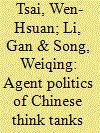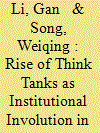| Srl | Item |
| 1 |
ID:
190422


|
|
|
|
|
| Summary/Abstract |
This paper analyzes the relationship between the Chinese government and domestic think tanks. Chinese think tanks in the cultural sector have a strong demand-side orientation; that is, they closely follow the instructions of the Chinese Communist Party (CCP) in their stand on culture-related policies. Since 2018, the CCP has strengthened its control over the propaganda and cultural affairs, using think tanks to this end. Think tanks act as dual agents, maximizing the benefits offered by their two principals – the party government and private businesses, while prioritizing the former. The paper examines the development of the Putuo Island Park in Zhejiang Province and the Cultural Industry Research Institute, the key cultural industry think tank in this province. While upholding Xi Jinping’s aspiration of developing China into a “cultural great power,” cultural think tanks’ main function is to endorse government policies and guide businesses to support those policies when necessary. The CCP under Xi has intensified its manipulation of think tanks to reinforce its control over ideology and the socialist market economy, resulting in a more complex relationship between the state and think tanks.
|
|
|
|
|
|
|
|
|
|
|
|
|
|
|
|
| 2 |
ID:
183642


|
|
|
|
|
| Summary/Abstract |
This analytical essay addresses the rise of Chinese think tanks in recent years. Despite their rapid growth, think tanks in China are generally shown to be becoming less effective in their normal functions and increasingly bureaucratic and dysfunctional. This essay adopts the concept of involution as its organizing framework. It argues that due to political and ideological impediments, Chinese think tanks are encumbered by institutional involution, a process of increasing in number and yet becoming more internally complicated. It asserts that the rise of Chinese think tanks provides minor yet telling evidence of involution within China's current governance system. The essay concludes by highlighting that this phenomenon is not unusual, but rather a pervasive and natural outcome of the Chinese post-socialist regime.
|
|
|
|
|
|
|
|
|
|
|
|
|
|
|
|